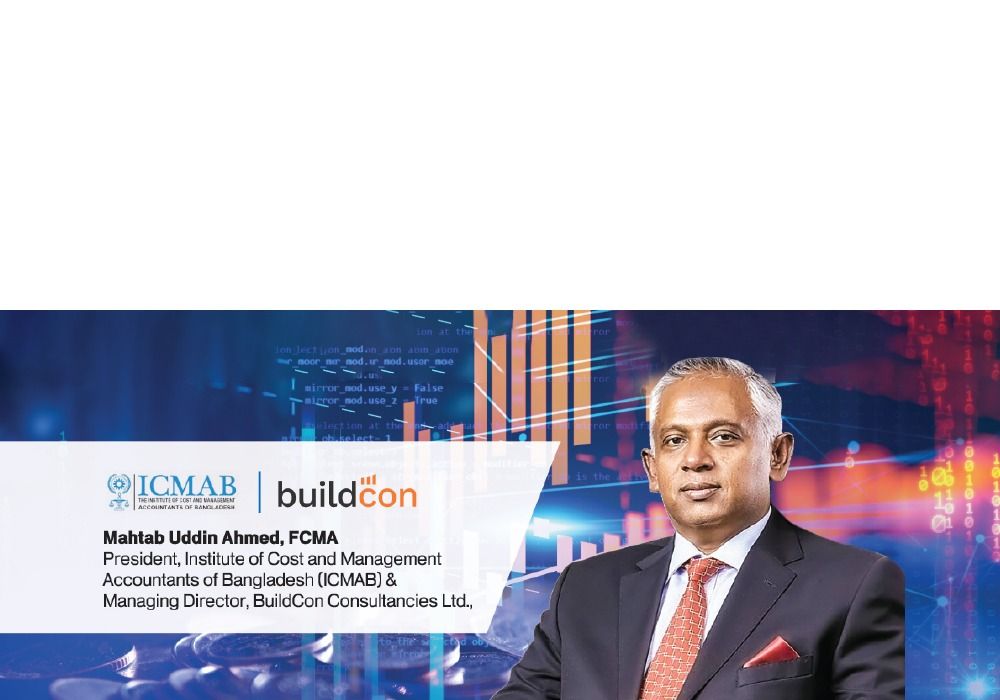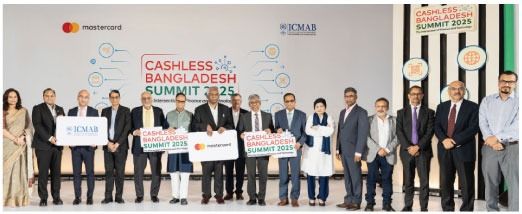- info@ficci.org.bd
- |
- +880248814801, +880248814802
- Contact Us
- |
- Become a Member
- |
- |
- |
- |
- |

In Bangladesh, money lives two parallel lives. For the poor villager, it hides in the folds of a lungi, under a mattress, or in the holy corner of the rice jar, because who needs banks when you have God? Meanwhile, the wealthy gentleman, a member of the political or business elite, doesn't believe in such simplicity. His money takes the first flight out - Dubai, Singapore, London, anywhere but here. The result? One half of the nation is literally sleeping on cash, while the other half is ensuring that Bangladesh itself remains penniless.
Now let's check the numbers. Only one-third of Bangladeshis have access to financial accounts, compared to 80% in India and 95% in China. Mobile Financial Services (MFS) are booming, but mostly for sending BDT 500 from son in Gazipur to mother in Rangpur, not for replacing mainstream banking. The irony? An economy of nearly USD 450 billion still runs on crumpled banknotes. Why? Because a massive black economy worth an estimated 30-40% of GDP thrives on cash. No receipts, no taxes, just vibes.
Our banks love to talk about going digital, even rushing to apply for digital bank licenses, but in reality, they still run on apps slower than Dhaka's internet on a rainy day, and branches drowning in paperwork older than the customers. Then comes the MFS progress. One player has indeed done a great job, but when a single service provider controls the majority of the market, competition and innovation suffocate, in the absence of competition law enforcement. True cashless means traceability, with every transaction serving as a breadcrumb for the taxman. But would our business tycoons and political elites, fueled by black money, ever allow their finances to be tracked? That's like asking a cat to wear a GPS collar.
 India, despite its chaos, managed demonetization in 2016 and gave a steroid boost to UPI, now handling 14 billion transactions monthly. Indonesia built an ecosystem that encouraged multiple players to innovate rather than suffocate. Both countries realised early that cashless isn't just about apps; it's about accountability, trust, and, yes, political will, something rarer in Dhaka than punctual trains.
India, despite its chaos, managed demonetization in 2016 and gave a steroid boost to UPI, now handling 14 billion transactions monthly. Indonesia built an ecosystem that encouraged multiple players to innovate rather than suffocate. Both countries realised early that cashless isn't just about apps; it's about accountability, trust, and, yes, political will, something rarer in Dhaka than punctual trains.
Meanwhile in Bangladesh, cash doesn't leave a trail: no VAT, no tax, no awkward questions. It's not about convenience; it's about invisibility. I have seen it firsthand: wealthy businessmen paying restaurant and grocery bills in thick wads of cash, ignoring the ease of cards. One well-known official from a 'prestigious' government body, famous more for corruption than service, never touches a credit card, not even when travelling abroad. Even local corporates prefer to pay salaries partly in cash and partly through accounts, ensuring everything stays comfortably hazy. Put all this together, and it feels less like we're moving towards a cashless society and more like we've proudly shifted into a cash-full economy with reverse gear.
While we argue whether to pay by cash or card, developed nations are already going beyond both. Apple Pay, Google Pay, facial recognition: swipe is passé. And yet, here we are, proudly tapping a plastic rectangle as if it were cutting-edge technology. If Bangladesh wants to leapfrog, it needs reforms, bold, uncomfortable reforms.
But here's the uncomfortable truth: none of these reforms will work without effective legal enforcement. Our justice system remains slow, selective, and often compromised. As a result, black money and corruption thrive without fear of consequence. Business tycoons and political elites exploit loopholes, knowing full well that accountability is weak and punishment is rare. Instead of being penalised, they are effectively incentivised, the criminals win, the honest lose, and the system quietly collapses into cynicism.
If we genuinely want a cashless society, we must go beyond technology and regulation; we must fix enforcement. Without a credible justice system that bites, every recommendation risks becoming yet another "policy paper" gathering dust.

That's precisely why the Cashless Bangladesh Summit 2025: The Intersection of Finance and Technology was held to move beyond jokes and slogans into actionable reforms. The keynote speakers and two panels offered twelve key recommendations, grouped into themes for clarity. Spoiler alert: each of these steps is obvious, logical, and long overdue. Which is why implementing them will be anything but easy, but needs political will.

1. Level Playing Field and Interoperability
First and foremost, a level playing field is essential. Right now, the digital economy looks like a rigged football match, with one superstar player getting the ball while others warm the bench. Speakers called for fair competition where fintechs, banks, PSPs, and MFS providers can all innovate without being suffocated.
Hand-in-hand with this is interoperability. Today, different players run parallel systems that rarely talk to each other. Imagine carrying five wallets just to pay for five shops; that's where we are. The summit made it clear: actual cashless growth demands seamless interoperability between all players.
2. Onboarding and Access
The second cluster of recommendations dealt with inclusion. If we want digital payments to reach the masses, access must be simple. Digital e-KYC for merchants was strongly recommended to onboard shopkeepers across the country without lengthy paperwork. In addition, mandating debit cards with every CASA account would normalize digital transactions. No more excuses of "sir, card request dei nai." If you open an account, you get a card, end of story.
3. Incentives and Disincentives
The panels also emphasised that we cannot preach cashless while pampering cash. Recommendations included:
. Disincentivising cash, by making large cash transactions costlier or restricted.
. Reducing taxes on digital devices, POS machines, QR devices, and even cards. Why should a merchant pay high duties for tools that help the economy?
. Lowering VAT and taxes on smartphones, so that every citizen, not just the urban elite, can use digital wallets.
These incentives and disincentives together send a simple message: the more digital you are, the more the system rewards you. The more cash you cling to, the more it hurts your pocket.
4. Cutting Bureaucracy and Fast-Tracking Innovation
Another repeated frustration was bureaucracy. Speakers urged streamlining approvals for digital product launches and cutting unnecessary government red tape. Innovation moves at the speed of ideas; approvals move at the speed of dusty files. Unless approvals are accelerated, Bangladesh will continue to miss opportunities.
5. Credit and Inclusion for SMEs
The summit also addressed credit access. For small entrepreneurs who lack formal credit histories, the recommendation was to adopt alternative credit rating models. This means assessing borrowers based on mobile transaction data, utility bill payments, or other digital footprints. For many SMEs, this could be the difference between staying stuck in the informal economy or scaling up into the digital mainstream.
6. Governance and Coordination
Finally, speakers highlighted the fragmented governance structure. Different agencies work in silos, often pulling in different directions. To fix this, the call was for a national committee on cashless economy, a holistic, cross-agency approach to strategy, policy, and implementation. Because let's face it: you can't build a cashless economy if half the government is cash-obsessed.
These recommendations aren't rocket science. They're common sense. But in a country where common sense often requires a committee to be understood, spelling them out matters. Together, these reforms create the infrastructure, incentives, and trust necessary for a cashless society.
If implemented, Bangladesh could leapfrog into a future where money isn't stuffed under mattresses or smug- gled into overseas condos, but flows transparently through digital channels. It would mean less corruption, more inclusion, and a financial system that actually serves the people instead of serving the elite.
Bangladesh has the ingredients: a young population, mobile penetration, and a booming economy. What we lack is the willingness to kill the golden goose of cash-based corruption. And without a justice system that enforces rules fairly and punishes corruption decisively, even the best recommendations will remain paper tigers. Until then, we'll continue to see two Bangladeshes, one storing notes in a lungi, the other laundering them through London.
A truly cashless Bangladesh is possible. But it will require political courage to face entrenched interests, bold reforms to break monopolies, accountability mechanisms that bite, and a justice system that does not let the criminals laugh all the way to the bank. It will require leaders to give up their favourite hobby: hiding wealth as if it were a national sport.
And that's why the Cashless Bangladesh Summit 2025: The Intersection of Finance and Technology, jointly organised by the Institute of Cost and Management Accountants of Bangladesh (ICMAB) and Mastercard, mattered so much. It wasn't just another event; it was a test. Do we want to move from cash-heavy chaos to cashless clarity? Or are we content being the world's most proudly cash-full, creatively corrupt, and hopelessly clueless economy?





